小学升初中英语语法复习-形容词和副词PPT (共27张PPT)
文档属性
| 名称 | 小学升初中英语语法复习-形容词和副词PPT (共27张PPT) |

|
|
| 格式 | ppt | ||
| 文件大小 | 234.5KB | ||
| 资源类型 | 教案 | ||
| 版本资源 | 通用版 | ||
| 科目 | 英语 | ||
| 更新时间 | 2020-07-17 00:00:00 | ||
图片预览



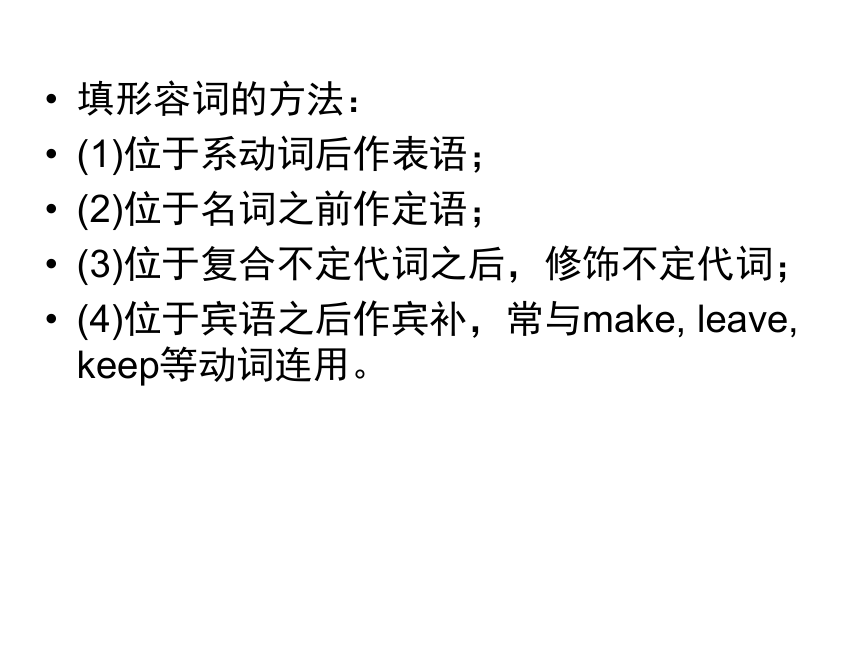
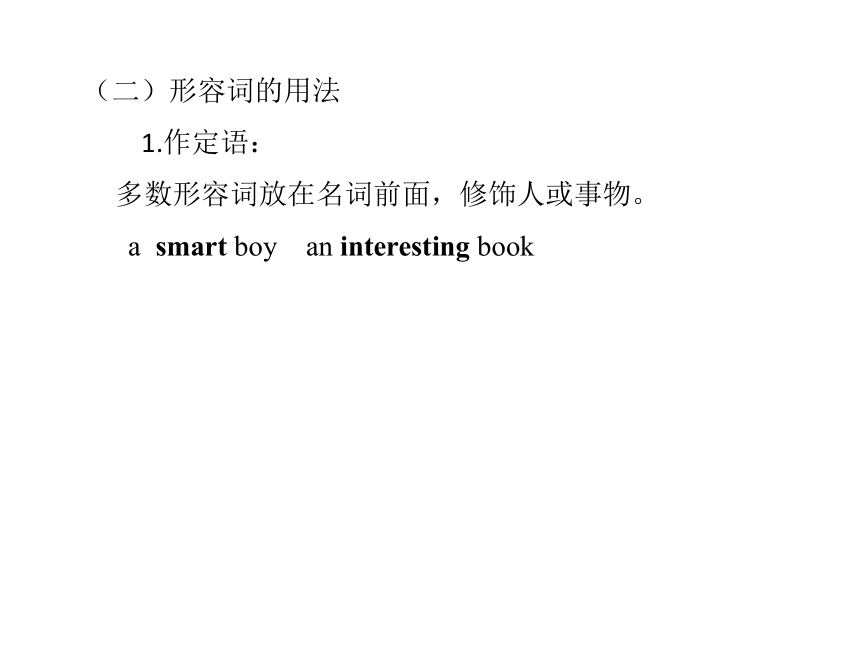
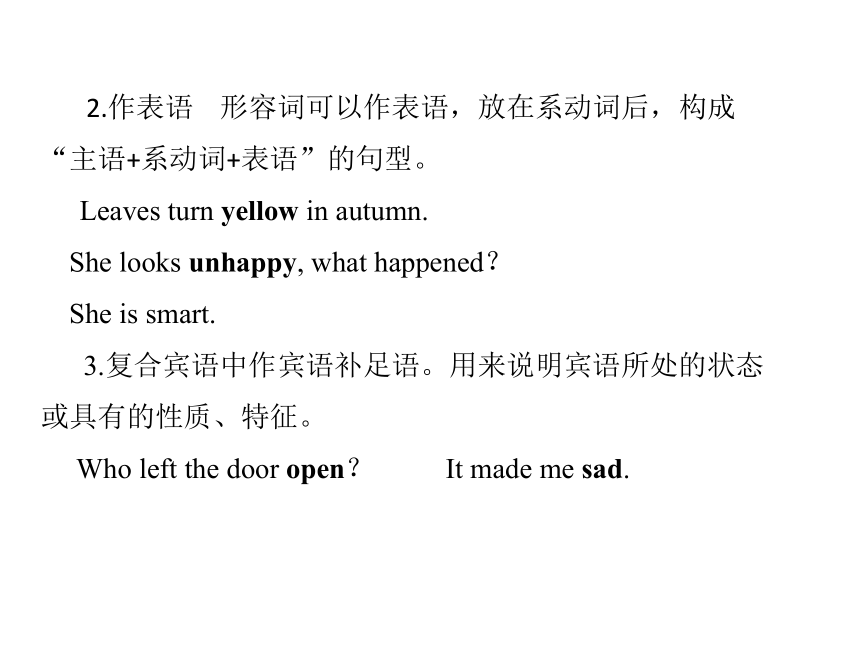
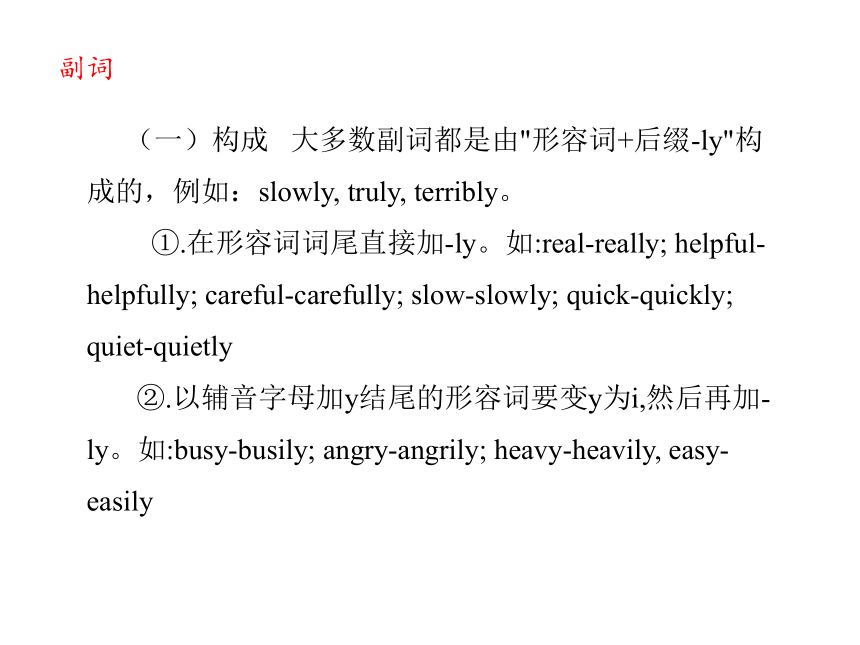
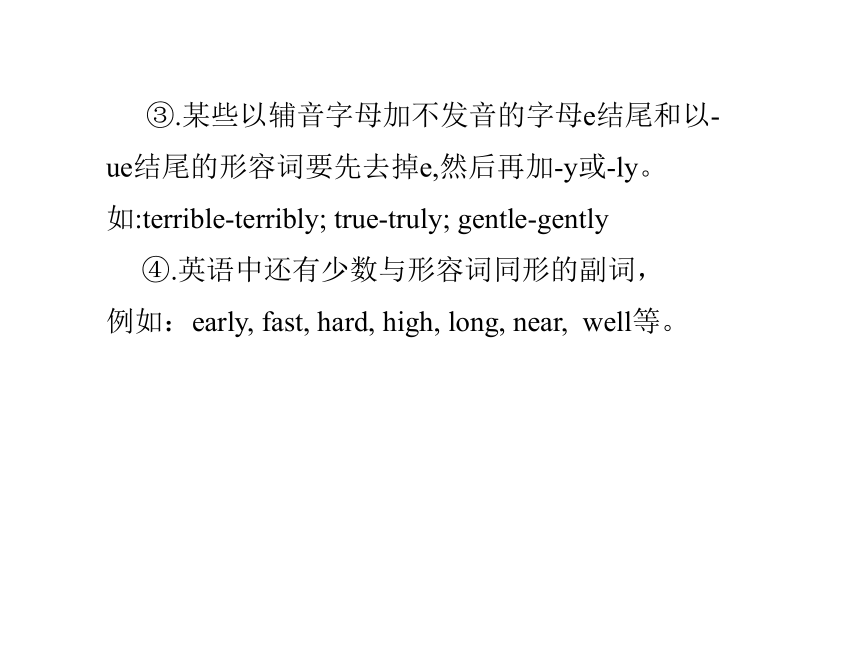
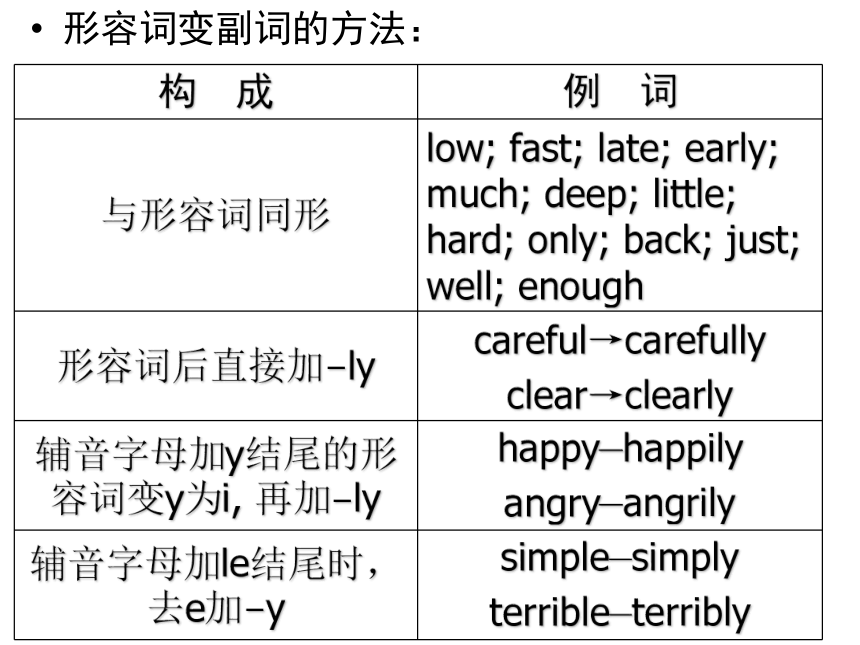
文档简介
形容词和副词
形容词
(一)定义 形容词是指用来修饰名词或代词,表示人或事物的性质、状态及特征的词。
拓展:由名词和动词变化而来的形容词,见下表
后缀
例词
动词
care→careless help→helpless
+less
+ing
interest→interesting move→moving
+ed
interest→interested move→moved
后缀
例子
名词
+y(表性质)
cloud→cloudy luck→lucky
+ly
friend→friendly love→lovely
+ful(意为"充满")
success→successful beauty→beautiful
+less(意为“没有;无”)
home→homeless hope→hopeless
+ese (用在国家名词后)
China→Chinese Japan→Japanese
+n(用在国家名词后)
America→American Africa→African
填形容词的方法:
(1)位于系动词后作表语;
(2)位于名词之前作定语;
(3)位于复合不定代词之后,修饰不定代词;
(4)位于宾语之后作宾补,常与make, leave, keep等动词连用。
(二)形容词的用法
1.作定语:
多数形容词放在名词前面,修饰人或事物。
a smart boy an interesting book
2.作表语 形容词可以作表语,放在系动词后,构成“主语+系动词+表语”的句型。
Leaves turn yellow in autumn.
She looks unhappy, what happened?
She is smart.
3.复合宾语中作宾语补足语。用来说明宾语所处的状态或具有的性质、特征。
Who left the door open? It made me sad.
副词
(一)构成 大多数副词都是由"形容词+后缀-ly"构成的,例如:slowly, truly, terribly。
①.在形容词词尾直接加-ly。如:real-really; helpful-helpfully; careful-carefully; slow-slowly; quick-quickly; quiet-quietly
②.以辅音字母加y结尾的形容词要变y为i,然后再加-ly。如:busy-busily; angry-angrily; heavy-heavily, easy-easily
③.某些以辅音字母加不发音的字母e结尾和以-ue结尾的形容词要先去掉e,然后再加-y或-ly。
如:terrible-terribly; true-truly; gentle-gently
④.英语中还有少数与形容词同形的副词,
例如:early, fast, hard, high, long, near, well等。
形容词变副词的方法:
构 成
例 词
与形容词同形
low; fast; late; early; much; deep; little; hard; only; back; just; well; enough
形容词后直接加?ly
careful→carefully
clear→clearly
辅音字母加y结尾的形容词变y为i, 再加?ly
happy—happily
angry—angrily
辅音字母加le结尾时, 去e加?y
simple—simply
terrible—terribly
(三)副词的分类
1、 时间和频度副词:often,today, shortly, yesterday.
2、 地点副词:here, everywhere, in, inside, above, home, upstairs, along, round , around
3、方式副词:carefully, properly, anxiously, suddenly, fast, well,
4、 程度副词,放在被修饰词之前:much,little, very,rather,so,too, extremely, entirely,almost, slightly.
5、 疑问副词,一般放在句首:how, when, where, why.
6、关系副词,一般放在句首:when, where, why.
7、连接副词:how, when, where, why, whether.
填副词的方法:
(1)用来修饰动词;
(2)用来修饰形容词;
(3)修饰整个句子;
(4)固定搭配。
(四)副词的用法及位置
1. 作状语修饰动词、形容词、其他副词、介词短语及全句。其位置如下:
(1)时间副词和地点副词一般放在句末,若两种副词同时出现,则地点副词在前,时间副词在后,也可把时间副词放在句首。
He did his work here yesterday.他昨天在这里工作。
(2)频度副词放在实义动词之前,助动词、情态动词及be动词之后。
You must always wait in a queue.你必须排队。
(3)程度副词放在所修饰的形容词之前(enough则放在后面)。如:very careful, old enough。
(4)修饰介词时(well, right, just, soon等)放在介词之前;修饰全句时,放在句首。
(5)方式副词修饰不及物动词时,放在所修饰的词之后;修饰及物动词时,放在动词之前或宾语之后。如宾语较长,也可将副词放在动词与宾语之间。
a. Jane’s father works hard.简的父亲工作努力。
b. Bill did the work very well.比尔做工作很好。
c. He wrote carefully some letters to his friends. 他认真地给朋友们写信。
2.作表语。作表语的副词一般是表示地点及位置的副词。放在系动词后面。如:They are downstairs.
3.作定语。作定语的副词一般是表示地点、位置的副词,还有一些表示时间的副词,都作后置定语。如:In the streets below, there are other problems.
4. 作介词宾语。如:in here,from abroad,since then,until recently,until very late等。
三、 形容词和副词的比较等级
大多数形容词和副词有三个等级:
1.原级,即原形。
2.比较级,表示“较……”或“更……一些”。
3.最高级,表示“最……”。
(一)形容词和副词的比较级和最高级的构成
1.规则变化
(1)一般在词尾加-er或-est。
smart→smarter→smartest tall→taller→tallest
(2)以不发音的字母e结尾的词,在词尾加-r或-st。
late→later→latest large→larger→largest
(3)重读闭音节词尾只有一个辅音字母时,先双写该辅音字母,再加-er或-est。
big→bigger→biggest fat→fatter→fattest
(4)以“辅音字母+y”结尾的双音节词,先把“y”改为“i”,再加-er或-est。
easy→easier→easiest funny→funnier→funniest
(5)多音节词和部分双音节词,在词前加more或most。
beautiful→more beautiful→most beautiful
interesting→more interesting→most interesting
2.不规则变化:
good/well→better→best
bad/badly→worse→worst
many/much→more→most
little→less→least
far→farther→farthest(多指距离)
far→further→furthest(也可指距离,但多指“时间、程度、数量上”)
(二)形容词和副词的比较级和最高级的用法
1.当两者人或者事物进行比较时,形容词和副词要用比较级,也就是-er形式,比较级常与than相连。
Li Lei is taller than Wang Jun.
2.当三者或三者以上的人或事物进行比较时,形容词和副词要用最高级,也就是-est形式,最高级之后常常用of ,in 等短语来限定比较的范围。
Li Lei is the tallest of all /in our class。
形容词最高级之前一定要用the ,但副词之前可以省略。如:Li Lei runs (the ) fastest of the three。
注意
3. the 加比较级……,the 加比较级……表示“越……就越……”。
The more trees we plant every year ,the better the environment will be.
4.比较级加and 加比较级表示“越来越”.
He walks faster and faster.
专项集训
1.Ma Yun, head of Alibaba, is one of _______ persons in the world.
A. rich B. richer C. the richest
2.—Who is your favorite singer, Mike ?
—TFBOYS. They are very _______ boys and girls.
A. proud of B. popular with
C. strict with
C
B
3.—The red car looks nicer than the white one. But its price is _______.
—I don’t have enough money,so I will buy the white one.
A. cheaper B. higher C. high
4.This camera is too expensive. I’d like a one.
A. cheap B. cheaper C. cheapest
B
B
5.The volunteer spoke as as he could to make the visitors understand her.
A. clearly B. more clearly C.the most clearly
6. If you eat and do exercise, you will be much healthier.
A. little;much B. less;more
C. less;most
A
B
7.—What was Jim wearing at the party?
—Nothing ________.He was in his usual shirt and jeans.
A.special B.simple C.important
8.Linda felt very ________ after the long way,so she stopped to have a rest.
A.surprised B.shy C.tired
A
C
形容词
(一)定义 形容词是指用来修饰名词或代词,表示人或事物的性质、状态及特征的词。
拓展:由名词和动词变化而来的形容词,见下表
后缀
例词
动词
care→careless help→helpless
+less
+ing
interest→interesting move→moving
+ed
interest→interested move→moved
后缀
例子
名词
+y(表性质)
cloud→cloudy luck→lucky
+ly
friend→friendly love→lovely
+ful(意为"充满")
success→successful beauty→beautiful
+less(意为“没有;无”)
home→homeless hope→hopeless
+ese (用在国家名词后)
China→Chinese Japan→Japanese
+n(用在国家名词后)
America→American Africa→African
填形容词的方法:
(1)位于系动词后作表语;
(2)位于名词之前作定语;
(3)位于复合不定代词之后,修饰不定代词;
(4)位于宾语之后作宾补,常与make, leave, keep等动词连用。
(二)形容词的用法
1.作定语:
多数形容词放在名词前面,修饰人或事物。
a smart boy an interesting book
2.作表语 形容词可以作表语,放在系动词后,构成“主语+系动词+表语”的句型。
Leaves turn yellow in autumn.
She looks unhappy, what happened?
She is smart.
3.复合宾语中作宾语补足语。用来说明宾语所处的状态或具有的性质、特征。
Who left the door open? It made me sad.
副词
(一)构成 大多数副词都是由"形容词+后缀-ly"构成的,例如:slowly, truly, terribly。
①.在形容词词尾直接加-ly。如:real-really; helpful-helpfully; careful-carefully; slow-slowly; quick-quickly; quiet-quietly
②.以辅音字母加y结尾的形容词要变y为i,然后再加-ly。如:busy-busily; angry-angrily; heavy-heavily, easy-easily
③.某些以辅音字母加不发音的字母e结尾和以-ue结尾的形容词要先去掉e,然后再加-y或-ly。
如:terrible-terribly; true-truly; gentle-gently
④.英语中还有少数与形容词同形的副词,
例如:early, fast, hard, high, long, near, well等。
形容词变副词的方法:
构 成
例 词
与形容词同形
low; fast; late; early; much; deep; little; hard; only; back; just; well; enough
形容词后直接加?ly
careful→carefully
clear→clearly
辅音字母加y结尾的形容词变y为i, 再加?ly
happy—happily
angry—angrily
辅音字母加le结尾时, 去e加?y
simple—simply
terrible—terribly
(三)副词的分类
1、 时间和频度副词:often,today, shortly, yesterday.
2、 地点副词:here, everywhere, in, inside, above, home, upstairs, along, round , around
3、方式副词:carefully, properly, anxiously, suddenly, fast, well,
4、 程度副词,放在被修饰词之前:much,little, very,rather,so,too, extremely, entirely,almost, slightly.
5、 疑问副词,一般放在句首:how, when, where, why.
6、关系副词,一般放在句首:when, where, why.
7、连接副词:how, when, where, why, whether.
填副词的方法:
(1)用来修饰动词;
(2)用来修饰形容词;
(3)修饰整个句子;
(4)固定搭配。
(四)副词的用法及位置
1. 作状语修饰动词、形容词、其他副词、介词短语及全句。其位置如下:
(1)时间副词和地点副词一般放在句末,若两种副词同时出现,则地点副词在前,时间副词在后,也可把时间副词放在句首。
He did his work here yesterday.他昨天在这里工作。
(2)频度副词放在实义动词之前,助动词、情态动词及be动词之后。
You must always wait in a queue.你必须排队。
(3)程度副词放在所修饰的形容词之前(enough则放在后面)。如:very careful, old enough。
(4)修饰介词时(well, right, just, soon等)放在介词之前;修饰全句时,放在句首。
(5)方式副词修饰不及物动词时,放在所修饰的词之后;修饰及物动词时,放在动词之前或宾语之后。如宾语较长,也可将副词放在动词与宾语之间。
a. Jane’s father works hard.简的父亲工作努力。
b. Bill did the work very well.比尔做工作很好。
c. He wrote carefully some letters to his friends. 他认真地给朋友们写信。
2.作表语。作表语的副词一般是表示地点及位置的副词。放在系动词后面。如:They are downstairs.
3.作定语。作定语的副词一般是表示地点、位置的副词,还有一些表示时间的副词,都作后置定语。如:In the streets below, there are other problems.
4. 作介词宾语。如:in here,from abroad,since then,until recently,until very late等。
三、 形容词和副词的比较等级
大多数形容词和副词有三个等级:
1.原级,即原形。
2.比较级,表示“较……”或“更……一些”。
3.最高级,表示“最……”。
(一)形容词和副词的比较级和最高级的构成
1.规则变化
(1)一般在词尾加-er或-est。
smart→smarter→smartest tall→taller→tallest
(2)以不发音的字母e结尾的词,在词尾加-r或-st。
late→later→latest large→larger→largest
(3)重读闭音节词尾只有一个辅音字母时,先双写该辅音字母,再加-er或-est。
big→bigger→biggest fat→fatter→fattest
(4)以“辅音字母+y”结尾的双音节词,先把“y”改为“i”,再加-er或-est。
easy→easier→easiest funny→funnier→funniest
(5)多音节词和部分双音节词,在词前加more或most。
beautiful→more beautiful→most beautiful
interesting→more interesting→most interesting
2.不规则变化:
good/well→better→best
bad/badly→worse→worst
many/much→more→most
little→less→least
far→farther→farthest(多指距离)
far→further→furthest(也可指距离,但多指“时间、程度、数量上”)
(二)形容词和副词的比较级和最高级的用法
1.当两者人或者事物进行比较时,形容词和副词要用比较级,也就是-er形式,比较级常与than相连。
Li Lei is taller than Wang Jun.
2.当三者或三者以上的人或事物进行比较时,形容词和副词要用最高级,也就是-est形式,最高级之后常常用of ,in 等短语来限定比较的范围。
Li Lei is the tallest of all /in our class。
形容词最高级之前一定要用the ,但副词之前可以省略。如:Li Lei runs (the ) fastest of the three。
注意
3. the 加比较级……,the 加比较级……表示“越……就越……”。
The more trees we plant every year ,the better the environment will be.
4.比较级加and 加比较级表示“越来越”.
He walks faster and faster.
专项集训
1.Ma Yun, head of Alibaba, is one of _______ persons in the world.
A. rich B. richer C. the richest
2.—Who is your favorite singer, Mike ?
—TFBOYS. They are very _______ boys and girls.
A. proud of B. popular with
C. strict with
C
B
3.—The red car looks nicer than the white one. But its price is _______.
—I don’t have enough money,so I will buy the white one.
A. cheaper B. higher C. high
4.This camera is too expensive. I’d like a one.
A. cheap B. cheaper C. cheapest
B
B
5.The volunteer spoke as as he could to make the visitors understand her.
A. clearly B. more clearly C.the most clearly
6. If you eat and do exercise, you will be much healthier.
A. little;much B. less;more
C. less;most
A
B
7.—What was Jim wearing at the party?
—Nothing ________.He was in his usual shirt and jeans.
A.special B.simple C.important
8.Linda felt very ________ after the long way,so she stopped to have a rest.
A.surprised B.shy C.tired
A
C
